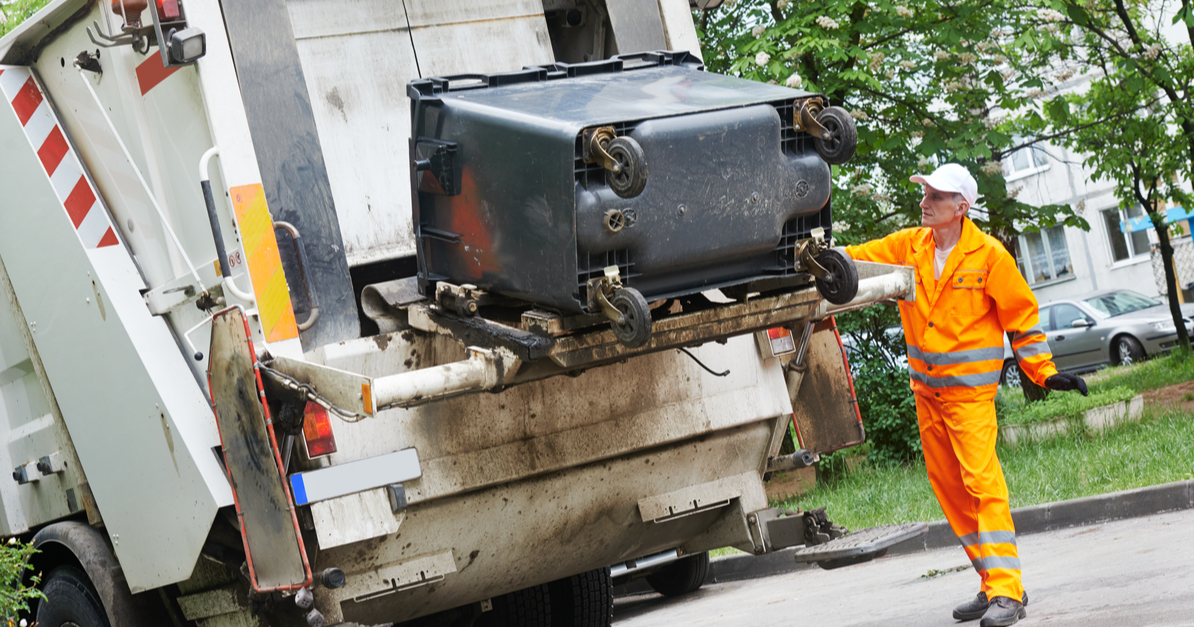
Sanitation workers in the solid waste management industry deal with heavy equipment, traffic hazards, adverse weather and potential workplace exposure to disease on a daily basis. Employment as a sanitation worker is physically demanding work that can lead to injuries in accidents or from cumulative stress and strain.
An injury or illness is considered to be work-related if an event or exposure in the work environment caused the condition or significantly aggravated a pre-existing condition. A sanitation worker who has suffered a work-related injury or illness in Pennsylvania may qualify for workers’ compensation benefits.
If you are a sanitation worker facing issues with your workers’ compensation claim, the trusted workers’ comp lawyers at Calhoon & Kaminsky are here to help. Talk to an experienced Harrisburg workers’ comp lawyer in Harrisburg, PA, today. Our law firm has helped sanitation workers and other hard-working Pennsylvanians in the Harrisburg area recover more than $221 million for job-related injuries. We want to help you move forward on the road to recovery and financial stability.
Call Calhoon & Kaminsky, P.C., at 717-695-4722 today or contact us online to schedule an initial consultation. We won’t charge you a legal fee unless we recover compensation for you.
Common Workplace Accidents Among Sanitation Workers
Sanitation workers typically collect solid waste and recyclable materials from designated pickup points along a predetermined route for transfer to a landfill, recyclable materials sorting center, or drop-off station. The workers’ job duties may include driving a garbage truck, operating hydraulic lifting and/or crushing equipment on the truck, lifting and dumping refuse containers, and completing basic work records.
Sanitation workers are exposed to all kinds of weather conditions while performing their jobs. They may ride on footsteps outside of the truck while hanging onto handrails. They work on foot in close proximity to passing traffic. Contact with refuse may expose a sanitation worker to hazardous waste, including needle stick injuries and infectious diseases.
Common injuries for sanitation workers include:
- Motor vehicle accidents. Most sanitation worker injuries involve the garbage truck striking or backing over a worker. Many other injuries to sanitation workers occur in rear-end collisions, accidents at intersections, and collisions with another vehicle.
- Falls. A sanitation worker can fall at any time and be injured. Falls from a truck, particularly a moving vehicle, can be particularly dangerous. Falls can cause head injuries, broken bones, and a variety of other injuries.
- Crushing accidents. Sanitation workers can get a limb trapped and crushed by compaction equipment on the truck during cleaning or maintenance, or while repositioning or retrieving material in the collection bin. Workaround hydraulic equipment can lead to lock-out/tag-out accidents that cause unexpected start-up, as well as electric shock and electrocution.
- Overexertion injuries. A sanitation worker may injure muscles, ligaments, tendons, and other soft tissue by lifting, carrying, pushing, pulling, or otherwise manipulating or wielding heavy containers and materials as part of their job duties. Back injuries caused by lifting are common injuries among sanitation workers and solid waste collectors. Overexertion injuries can occur because of a single incident or because of cumulative wear from years of heavy lifting.
- Infectious exposure. Sanitation workers risk contracting a variety of illnesses, via exposure to human blood and bloodborne pathogens, as well as to discarded needles. A sanitation worker cut by broken glass or another sharp object in the trash can contract a serious infection from contact with contaminants in refuse.
- Inclement weather exposure. Sanitation workers work in cold, hot, and inclement weather and risk such exposure-based illnesses as cold stress, hypothermia (abnormally low body temperature), frostbite, dehydration, heat stress, and heat exhaustion.
A sanitation worker who has sustained an injury and is unable to work for seven days or longer will typically qualify for workers’ compensation benefits.
Compensation for sanitation worker injuries may include payment for all medical procedures needed to treat an injured employee, from emergency response to medication, surgery, and rehab. Additional workers’ compensation benefits are meant to replace a portion of the worker’s lost wages due to their temporary or permanent disability.
What You Should Do If Injured as a Solid Waste Sanitation Worker
It is important to report a workplace injury to your employer so the company may initiate a workers’ compensation claim. In Pennsylvania, an employee has up to 120 days to notify their employer about a work-related injury. But you should report being hurt on the job or receiving a medical diagnosis as soon as possible.
Follow company policy for reporting your injury/illness, such as completing a form or meeting with HR. Be sure that you have submitted a written description of what happened to you that states the date and time of the accident and how your work duties caused your injury.
You should name any supervisors or other co-workers who witnessed your accident. If your employer attempts to deny your workers’ comp claim, a likely approach is for the employer or insurance administrator to argue that your injury was not work-related. Having the corroboration of fellow workers will help substantiate your claim.
Pennsylvania employers are required to report all employee injuries to their insurer or, if self-insured, to the person responsible for managing the employer’s workers’ compensation program.
In addition to reporting your injury to your employer, you must see a doctor. It is important to receive medical care and to obtain a formal medical diagnosis to establish that you are unable to work. Make sure that any doctor who examines you understands that you have suffered a work-related injury/illness and explain the aspects of your job that led to your condition.
It is also important that you follow the doctor’s orders for treatment after obtaining a diagnosis. Skipping follow-up doctor’s appointments, failing to fill prescriptions or take medications, or missing physical therapy sessions can be used against you if your employer chooses to dispute your claim.
As you move forward, save any record or receipt or make your own records to document your injury, pain, medical care, costs and losses, and recovery, including setbacks. Anything may be helpful evidence if you have to fight a disputed workers’ compensation claim.
If your employer and the insurance carrier accept liability for your injury, you should receive one of three notices from the PA Workers’ Compensation Bureau within 21 days:
- Notice of Temporary Compensation Payable, which means the insurer is extending the investigation period to 90 days
- Notice of Compensation Payable, which means the insurance company has at least partially accepted your claim – but may not be paying all benefits you should receive
- Agreement for Compensation, which outlines the benefits the insurer intends to pay you.
If your employer or their insurance carrier denies liability for your sanitation worker injury, you will receive a Notice of Workers’ Compensation Denial from the PA Workers’ Compensation Bureau. This means your claim is denied and the only way to pursue it further is through legal action.
How Our PA Workers’ Compensation Lawyer Can Help You
It’s not unusual for an employer or their insurer to claim that a sanitation worker’s injury is not an occupational injury. Back pain, for example, is a common problem for many people as they get older. Who is to say if your back pain was caused by your job duties as a sanitation worker? In other cases, an employer may acknowledge the worker’s injury is job-related but argue that it isn’t bad enough to justify staying out of work and collecting workers’ comp.
Our Harrisburg workers’ comp attorneys have the knowledge and skill necessary to help you overcome invalid objections to your injury claim and seek the proper benefits available by law. We can help you file an initial workers’ comp claim or appeal a denied claim or an improperly low benefit.
An attorney from our firm can help you establish the evidence needed to support your claim. We can help you gather medical records and doctor’s statements that describe the symptoms of your injury and demonstrate that your job duties as a sanitation worker caused your injury. If necessary, we can refer you to medical specialists who know the Pennsylvania workers’ compensation system and what is required of a claim.
Our experienced workers’ comp attorneys know how insurance companies work to minimize benefit payouts even when they approve a sanitation worker injury claim. One approach is to downgrade your disability rating and then pressure you to accept a low settlement offer. We’ll review all of your costs and losses and negotiate to obtain a fair and proper settlement for you.
If your workers’ comp benefits have been denied, let a PA workers’ comp lawyer at Calhoon and Kaminsky, P.C., review your claim and advise you of your options. We can take care of everything required, and we will represent you in court if that is what is required to obtain justice for you.
Meet with Our Pennsylvania Workers’ Compensation Lawyers
Contact the workers’ compensation attorneys at Calhoon and Kaminsky, P.C., in Harrisburg, PA, today to find out how we can help you get the full workers’ comp benefits you deserve. Call us today at 717-695-4722 or reach us online to set up a free, no-obligation legal consultation.




